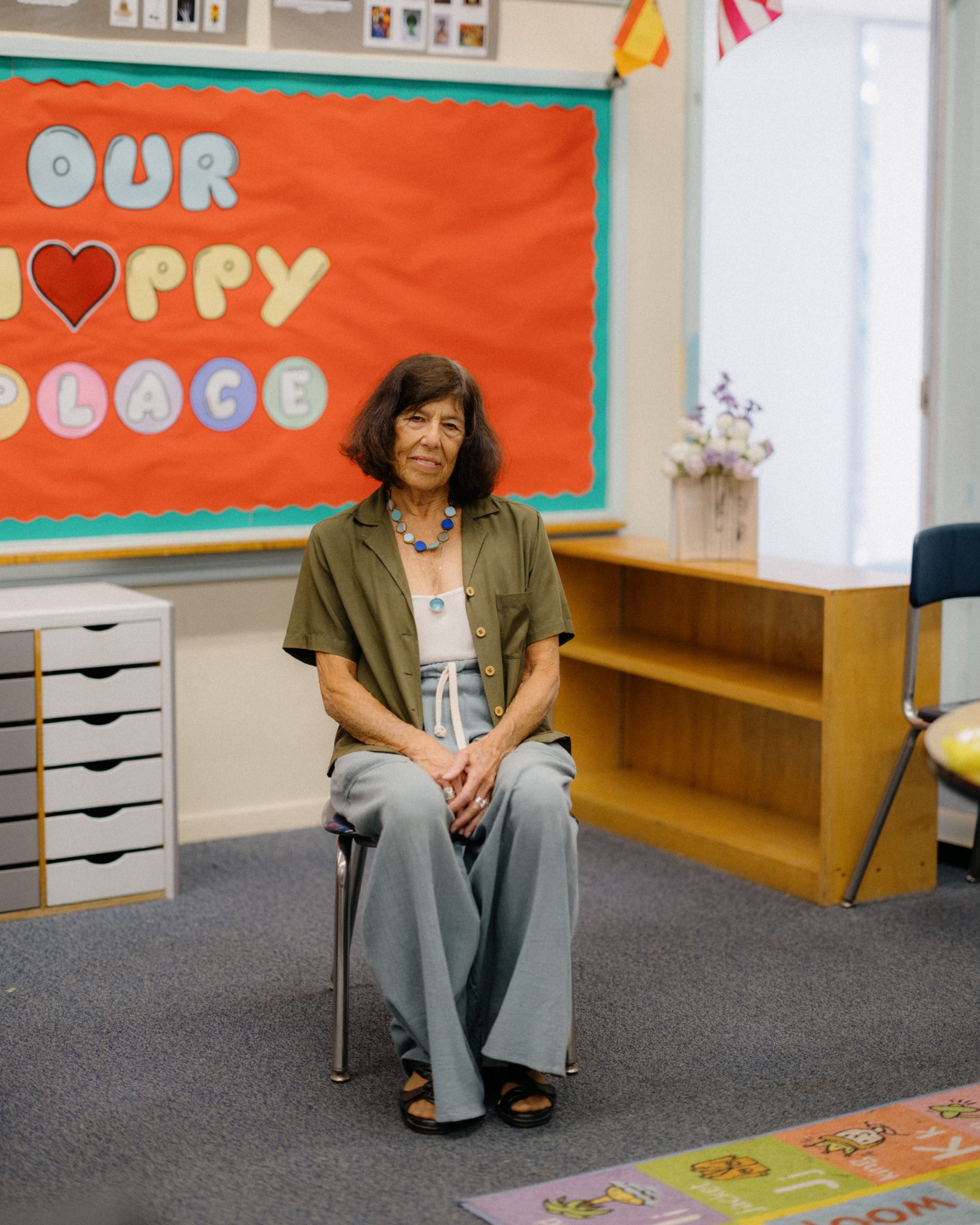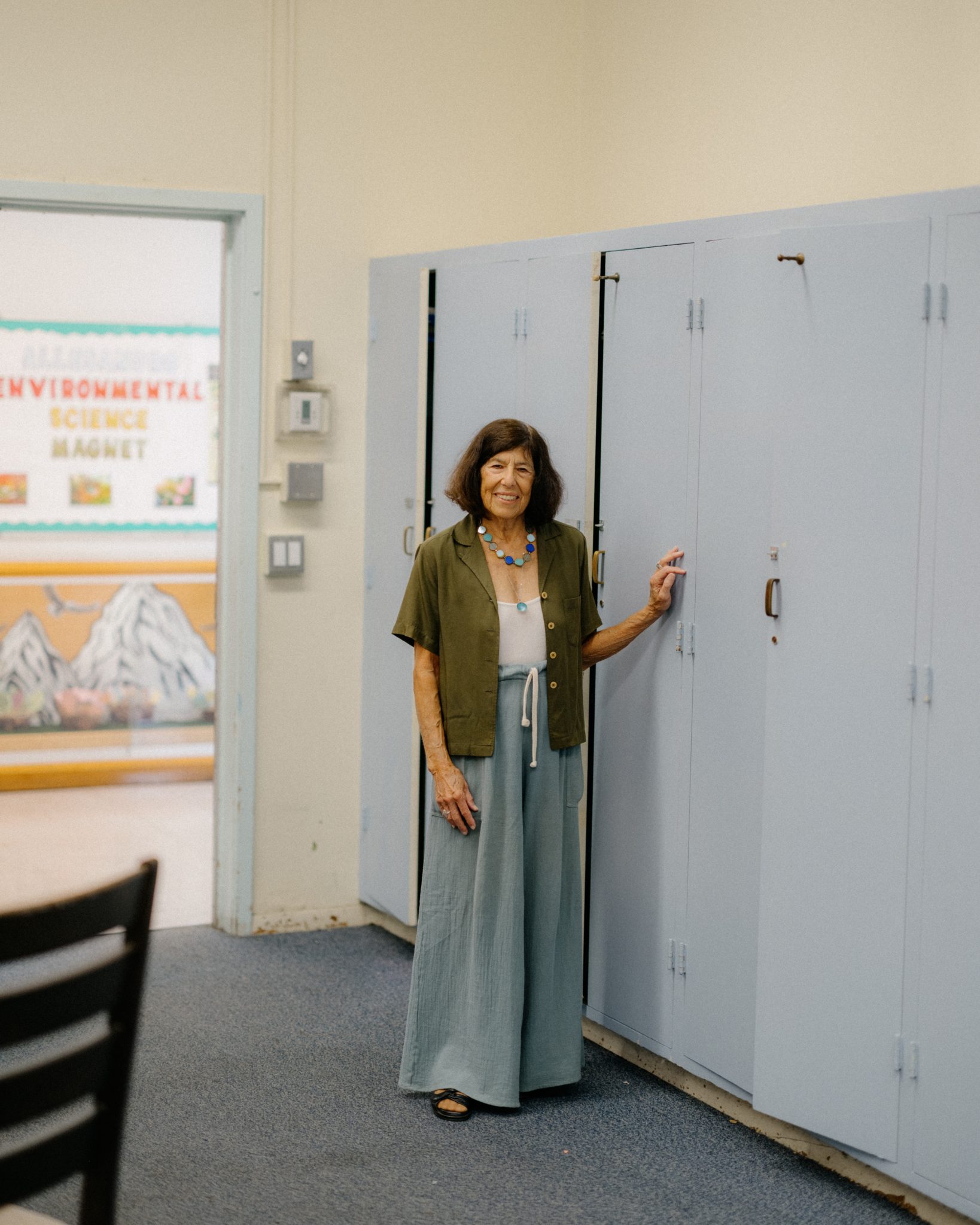FEATURED STORY: Ronni Solman
Fighting for Educational Justice
Ronni Solman moved to Los Angeles in 1970, for work and to chase the sun. At the time, she was involved with the New York chapter of the Committee to Defend the Black Panthers, working to raise money for legal defense for the Black Panther Party. The group needed a representative to work with the Los Angeles chapter, and Ronni happily obliged. She’d always dreamed of coming to California; the idea of a place where it was mostly sunny all the time was appealing to this native New Yorker. When work with the committee stalled due to illegal government interference and persecution, Ronni sought out other options.
“I knew I liked working with kids and being with people, so I thought I’d probably be a teacher or a social worker when I grew up. In LA, I was drawn into a private school daycare teaching position, which then propelled me to pursue my [teaching] credential and become an elementary school teacher.”
Living in Venice at the time, Ronni worked for a variety of early childhood and elementary schools on the Westside before entering the Los Angeles Unified School District as a teacher at the now-defunct Hammel Street Children’s Center (now called Early Education Centers) in East LA. It was here that Ronni was first approached by a union representative of United Teachers Los Angeles (UTLA), an invitation she accepted with open arms.
“I was like, “I can join a union. Oh, yay!.” I was ready to join any union if I could. At the time, nobody really paid much attention to children’s center teachers—they were just organizing high school teachers—but I remember first getting involved and attending union meetings at the children’s center.”
Ronni’s openness to unions and political organizing was partially due to growing up in a politically conscious household. Both of her parents were organizers in New York City and members of the local Communist Party.
“I was what they call a red diaper baby, which means my parents were already members of the Communist Party or friends of Communist Party members. I grew up in the 1950s and 1960s, and my earliest memories of getting our black and white TV included my parents sitting around the TV and watching the McCarthy-Army hearings.”
While at Hammel, Ronni continued to live in Venice, undertaking a daily commute to East LA. Living by the beach became a financial strain given her teacher’s salary, and she—along with her husband and growing family—moved to Elysian Valley in 1978. Seeking to switch to a school closer to home, she applied to both local elementary schools, Allesandro Elementary and Dorris Place. Allesandro had an opening, and she soon started working as a pre-K teacher, staying there for the next 30 years and retiring in 2009.
At Allesandro, she continued her work with the union, becoming the union chapter chair. At the time, UTLA was very much a traditional teacher’s union, solely fighting for salary increases, benefits, and grievances against difficult principals. That began to change in the 1990s with a cohort of progressive teachers pushing for the union to address social and racial justice issues in addition to the traditional union priorities. At the end of the decade came Prop 227, a piece of state legislation that outlawed bilingual education.
A coalition of UTLA teachers, a few parents, and some students began to organize and advocate against it, forming the Coalition for Educational Justice (CEJ). The coalition was based on a radical idea: a coalition of teachers, parents, and students advocating for the needs of the most under-resourced and disadvantaged schools and students.
“Traditionally, teachers and parents were not considered allies, especially by the teacher’s union and by parents’ groups. Parents’ groups felt that the teacher’s union was too entrenched in teacher-focused demands. And teachers were always worried that parents’ involvement would challenge their agency. CEJ’s notion was that power is built by uniting parents, teachers and students. It’s taken 20 years to reach the point where the students are actually leading.”
At the time, teachers were encouraged to plan out salary point classes and Ronni planned one for interested elementary teachers that included parents as well. These classes would allow teachers to qualify for a “salary point” in order to earn a raise based on attendance. But to Ronni these classes also served as organizing tools, where teachers and parents could learn about topics related to public speaking, meeting facilitation, ally engagement, and advocacy strategy.
“That opened my eyes to how effective it is to educate parents and teachers at the same time about the same stuff. They could see the teachers were supportive of parent demands and that parents were supportive of the teacher demands.”
To engage students, Ronni, along with other teachers, established a CEJ chapter at Allesandro—one, if not the only, elementary school chapter throughout LAUSD. Here students from all grade levels met weekly to discuss issues that they felt should be addressed at the school and in their communities. The students were encouraged by teachers to come up with their own icebreakers and agendas for the meetings, tackling issues such as the quality of school lunches, eliminating the need for standardized testing, and environmental issues. Their advocacy helped bring a salad bar, stocked with nutritious food and fresh vegetables, to Alessandro, as well as a greenhouse for all grade levels to use.
Additionally, Ronni’s pre-K class incorporated social justice themes. Along with her co-teacher Ms. Hubbard, they planned lessons that allowed even young children to grasp these complicated topics.
“Ms. Hubbard and I, she’s Black and I’m white, we are both very conscious and concerned about civil rights and social justice. During Black History Month and around Dr. Martin Luther King’s birthday, there was always a pre-K lesson about him, and we’d use library books that were geared for young children about his history. We organized a Freedom March, marching around the school singing “We Shall Overcome.” I’m sure some kids didn’t know what the heck it was all about, but there were some kids who did.
It did have its way of filtering down and educating students about how you can go on a march and fight for freedom.”
Throughout her 30-plus years as a teacher, Ronni has impacted and influenced countless students through her political organizing, instilling in students, teachers, and parents the foundations for effective advocacy that has brought about much-needed change for the most underserved school populations.
“When I was young, I was empowered to go to actions and protests. There was a period where it wasn’t that way for kids, partly because there were difficult times societally and because of crime. But we had to teach students and youth how to be empowered and how to go out on their own.”
After retiring from teaching in 2009, Ronni continues to be active in CEJ, now known as Students Deserve, along with other advocacy efforts. This coalition of students, parents, and teachers has grown into a city-wide organization with chapters in numerous high schools in all corners of LAUSD. Through their efforts, the Black Student Achievement Plan, created by Students Deserve and allies, has been implemented and continues to receive funding from the District. Other demands have also received increased monies to support LGBTQ+ students and immigrant students and their families, amounting to more than $175 million per year.
These victories did not occur overnight, but rather have taken decades of activism to achieve lasting change and bring support for students who need it most.
And for any aspiring organizers and activists, Ronni has a few words of advice.
“Our diversity is our strength. Remember positive energy. I always smile. Be happy and glad to see people, and make them feel included, and make them feel that victory and accomplishment are possible. Celebrate your victories because that’s what keeps you going.”
Ronni Solman is a retired LAUSD teacher, having taught at a variety of schools for more than 30 years. For the majority of her teaching career, she taught at Allesandro Elementary School in the Elysian Valley neighborhood of Northeast LA. Here she organized students, parents, and teachers to advocate for their wants and needs, forming an elementary school chapter of the Coalition for Educational Justice. A grassroots organizer, she’s been heavily involved with other likeminded groups such as Students Deserve and SoCAL350.
RELATED STORIES

The Coastal Conservancy
In the late eighties, while in graduate school at UC Berkeley, Christopher Kroll began a part-time job at a relatively new and small state agency: the Coastal Conservancy. Established in 1976, “the Coastal Conservancy was set up to be a project agency to actually work with local governments, and nonprofits, on issues that could not…

A Glassell Park Story
A more than twenty-year resident of Glassell Park, Helene Schpak understands that civic engagement is an essential part of healthy community living. “It’s giving back. It’s being part of a society, part of a community. If you care, sitting back isn’t going to accomplish anything. Pace yourself and volunteer, put in some effort, and sometimes…

Learning from Nature
For more than 34 years, Harry Boyajian has directed and managed site remediation of polluted lands all over the United States. His work has taken him from North Dakota to Arizona, and all up and down California where he’s based. Closer to home, Harry has worked extensively on sites adjacent to the LA River, post-industrial…

Building Los Angeles State Historic Park (LASHP)
The 32-acre plot that now houses the Los Angeles State Historic Park (LASHP) is a testament to the power of community activism. Throughout hundreds of “hearing sessions” hosted by California State Parks, nearby residents voiced their wants and needs for the land — and, by doing so, saved it from becoming the “River Station Business…


